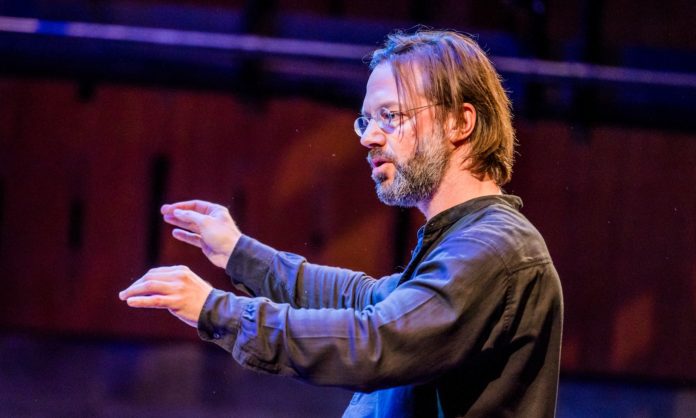He has an austere reputation – the highbrow math-rocker, the conservatoire-trained composer, the son of the rigorous, joyless jazz saxophonist Anthony Braxton – but much of Tyondai Braxton’s best work has a touch of whimsy about it. Listen to the munchkin-voiced chorales and tribal drums of the Battles album Mirrored and the kazoos, slide whistles and slurring cellos that graced his solo debut Central Market – silliness suits him well.
Unfortunately, his first full orchestral work shows no whimsy, no cartoon-like silliness, no shards of light. Entitled Telekinesis and conducted by André de Ridder, it is a solemn work that weaves together various discrete elements: wordless, howling vocals from a 19-piece choir, the FX-laden jangle of electric guitars, the flutter of electronic drums, chirruping woodwind, churning strings. It marshals its diverse sonic sources well and meanders entertainingly for an hour, like a static horror movie score, but there is little harmonic development, no resolution and no real sense of trepidation.
Still, Braxton curated a very good supporting bill that overshadowed his own work. Best of all was Expanding, an electro-acoustic piece by the American composer Kaitlyn Aurelia Smith, a riot of Ryuichi Sakamoto-style Japanese percussion, Afrofuturist marimbas and woozy synths set to a juddering 5/4 rhythm; while Brooklyn-based Qasim Naqvi’s neurotic, jagged minimalism also hit the spot. Braxton also chose the 1954 work Déserts by the ultra-modernist chieftain Edgard Varèse – an infuriating, horrible but oddly compelling piece that mixes a densely written score for horns, woodwind and percussion with a series of eerie musique concrète recordings (these were taped by Varèse himself 65 years ago in various New York factories, and conjure up images of industrialised war and torture). It is not the kind of piece you’d want to listen to again in a hurry, but it was unsettling and thought-provoking in a way Braxton’s work was not.
Instead of trying to fulfil Varèse’s mirthless idea of creating a musical bomb that will integrate all music and noise, perhaps Braxton should play to his whimsical strengths.
























